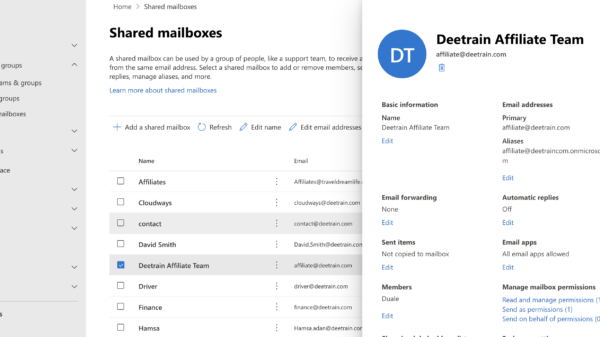The primary goal of help desk specialists is to assist clients who want assistance, which might entail more work tasks than you might expect.
Working at the help desk can be an excellent entry-level Job. The support industry is expanding as businesses continue to develop and invest in technology to fuel this expansion. But, more importantly, working at a support desk may place you in an excellent position for future advancement.
Your primary tasks as a help desk expert are to give technical assistance and support, including setting up and fixing computers or replying to a customer’s query about how to use their computer.
Why is Help desk a Good Fit for Your First IT Job?
Whether you’ve always been interested in computers or assisting others with their computers, you can now put your knowledge to good use. Training to become a computer network technician is a fantastic opportunity to develop your IT abilities and focus on the areas you like the most.
Working in the IT sector implies that you have a great future ahead of you and that you will not be locked in a dead-end job because the IT field is constantly growing and in need of new experts.
While you won’t start as an IT Director right away, you can get your feet wet by operating the help desk. The help desk plays a vital role in the IT community, and many people rely on it for assistance when they don’t understand how to use their computer or when their network is malfunctioning.
As your first career in IT, becoming a computer network technician and working the help desk will be rewarding and will allow you to assist others in various ways.
Below, we will discuss how working at the help desk is an incredible open door for you!
IT On-The-Job Training
On-the-job training is crucial since you not only learn the secrets of the trade, but you also do not have to pay for it.
Working as a help desk technician will teach you how to traverse a computer, the ins, and outs of networking, and how to enhance your general technical abilities.
Working at the help desk also gives you the possibility to advance in the organization. Remember, if you can’t help clients repair their computer problems, how can you handle more significant mistakes in a higher-level position?
You will be able to focus on your career objectives
While it may not have occurred to you, manning the helpdesk will allow you to focus on your professional objectives. Because you will be dealing with a wide range of issues and difficulties, you will be able to choose which area of IT you love the best.
For example, you may opt to go deeper into the IT sector and focus entirely on a company’s security structure and encryption.
Improve your customer service skills
Whatever your final objective in IT is, you must have outstanding customer service abilities. Working at the help desk, on the other hand, will allow you to improve your customer service skills.
Effective communication and clear instructions can assist you in providing consumers with the assistance they require while also providing a positive experience.
You will learn how to collaborate with people and as a team and improve your customer service abilities. These abilities are essential for every career in the IT sector, and developing them today helps you grow fast.
Investigate every possibility
Help desk positions are not always a dead end for an IT professional’s career. In certain businesses, there may be opportunities for advancement and growth. Consider your help desk job’s professional growth opportunities.
Look at how ex-help desk personnel has advanced within the business to see if your firm up-skills and assists with career growth. Whether or not this is the case depends on the firm you work for and their approach to upskilling, training, and development.
Some organizations nurture their employees and urge them to create a development plan for themselves, while others provide slight advancement opportunities.
Assess and Act
In an ideal environment, moving from help desk to another department within the same business would be natural.
In truth, most businesses find it relatively easy to fill technical jobs through traditional hiring methods. Investing time, effort, and resources in an employee who may depart shortly is not a good business or financial decision.
Some businesses believe that hiring competent technical employees is preferable to developing them in-house.
What you need to know about working at an IT help desk
You inquired about what it’s like to work at the IT help desk, and we have answers! We invited IT professionals to share their insights and advise what you should know before applying for your first IT support job.
Hard skills development
Help desk technicians are familiar with almost every system that a firm utilizes or offers. Operating systems, apps, networks, the Internet, hardware, and peripherals are all included.
A help desk position allows you to obtain an in-depth, real-world understanding of these technologies, which is especially beneficial for individuals with little or no professional experience. This broad exposure helps you develop your complex abilities and select the technologies you are most interested in.
Soft Skill Development
There is no doubt that well-developed technical abilities are vital for any IT worker, but this does not imply that they are required to establish a successful career.
Managers are increasingly seeking individuals with excellent interpersonal skills, such as communication, problem-solving, and leadership qualities.
These “soft skills” may be taught at the help desk. Consider this: You may improve your communication skills by doing step-by-step troubleshooting of a proxy server setup with someone inexperienced with the workings of the e-mail system.
Keeping your cool when assisting a stressed-out caller with his situation can also help you develop your tact and diplomacy.
Possibility of advancement
The most excellent part about working at a help desk is that you can frequently use the skills and experience you earn there to advance your career. Many networks, Web, and e-mail administrators, for example, began on the help desk.
Furthermore, there are several chances for growth inside the support desk itself. Tier 2 and Tier 3 professionals are required to supervise, train, and assist junior help desk technicians in large corporations. Another possible career option is to work as a support desk manager.
Help desk representatives do not necessarily spend their entire day on the phone
The days of guiding clients through troubleshooting procedures over the phone are long gone. Many companies now have easier processes in place for tech support to assist consumers due to new technologies.
Some businesses use ticketing systems, while others prefer chat systems and, more recently, popular social media platforms such as Facebook Messenger and Slack.
These communication tools may make your work simpler and reduce client dissatisfaction. Help desk agents can frequently offer a link with troubleshooting instructions or copy and paste answers that solve common issues. It makes the work far less demanding than you would have anticipated.
Your communication Skills will be tested
Not all consumers will be technologically competent. Many of them will be unfamiliar with technical jargon used by IT professionals, which can make the task more challenging.
When describing technological concerns to the general public, IT support workers must be creative. The most challenging task you may have at first is communicating technical jargon to individuals who are not technically informed.
Like any other job, people who operate the IT help desk will improve their skills, ultimately extending their language for a non-technical audience. Fortunately, with time and experience, these difficulties became less complicated.
You’ll have a lot of intriguing stories to tell when you get home.
One thing is sure: a typical day in the life of a support desk technician is never dull! These experts come across a wide range of intriguing and odd user issues. You never know what to expect from a day at the help desk.
The most entertaining aspect of working at an IT help desk undoubtedly hears the odd stories and demands that clients phone in with. You may hear everything from dogs destroying technical equipment to lengthy crazy rants about difficulties with the product or service.
Not every support ticket will be entertaining, but the diversity will keep you on your toes. The work that you will like the most is not knowing what the next call will bring.
Help desk technicians are an essential element of every business.
These tech professionals hear honest thoughts and worries from customers throughout the day—concerns that corporate executives must be aware of.
This implies that IT support specialists have more power than you may imagine. These IT professionals are the IT department’s eyes and ears.
Help desk personnel notify the IT team of any critical issues that may necessitate quick attention to guarantee network integrity, accessibility, and business continuity.
Instead of considering IT support technicians to be at the bottom of the career ladder, consider professionals to be on the frontlines of customer service, giving necessary expertise to corporate leaders.
Working at an IT support desk can be a fulfilling job.
Working in IT support has a poor reputation due to popular misconceptions about the industry. What many outside the industry are unaware of is that it may be a highly fulfilling job!
When help desk professionals solve an issue, they have the potential to brighten someone’s day. Don’t underestimate the beneficial influence this effort has on others.
To get started, you do not need a college degree.
Many professions in technology demand a Bachelor’s degree or more, while the IT help desk does not. Most people with a talent for technology and some basic training can pursue this job.
While higher education can help you obtain an IT help desk position in today’s market, it is no longer required. IT-specific credentials and hands-on experience will be the most excellent strategies to break into the industry.
Several online coding courses and technology introductory classes are accessible, so it is critical to make an informed decision. Look for a program that is mainly designed for IT support positions.
Can working as an IT help desk professional be the start of a successful IT career?
The IT help desk is a wonderful place to start for anyone interested in the IT industry but does not want to invest a lot of time and money in a degree right now because of its accessible education requirements.
Please take advantage of every opportunity to learn more about your position, both inside and outside of it.
Working at the help desk allows you to acquire experience, develop your talents, and network inside the organization regularly. Don’t let this fantastic chance pass you by—volunteer for stretch initiatives and exhibit your interest in professional development wherever feasible.
What is the Average Salary of an IT help desk Specialist?
Salary increases of up to $82,000 per year are possible as you gain expertise. Most help desk positions pay around $40,000 per year on average. A support representative earns around $30,000 per year, whereas a senior help desk tech earns around $56,000 per year.
Because most IT businesses require some help desk support for internal workers and support for a company’s products, the help desk job outlook is solid. Help desk jobs fill up quickly since they are an excellent beginning point for most computer occupations and are filled by many college students.
Conclusion
Not everyone is suited for a helpdesk job. Repetition, being tethered to your headset, and shift work all have drawbacks. However, this is not the case for everyone. Some people find the consistency of helpdesk work to be beneficial, while working swiftly with expertise is reassuring to others.
If you enjoy working with people, a client-facing position such as helpdesk consultant might be ideal for you — everyone is different. You must determine if you want to continue working in a helpdesk job or if you want to attempt something new, interesting, or even dangerous. Personal development might be uncomfortable at times, but the benefits are well worth the effort.









